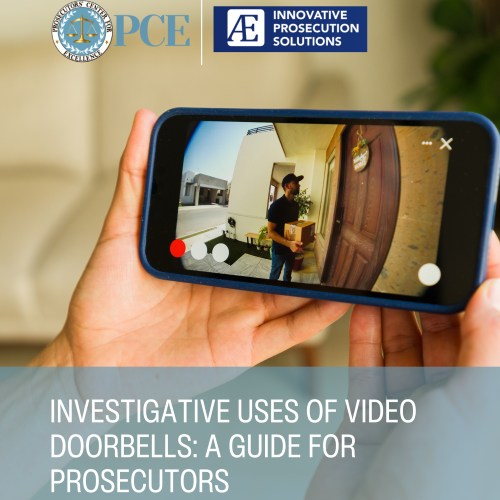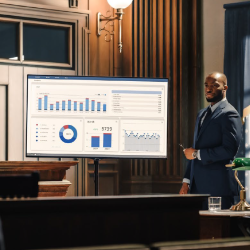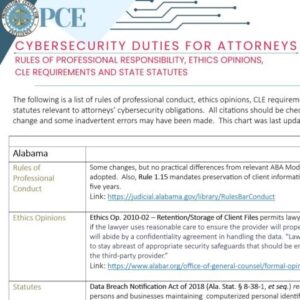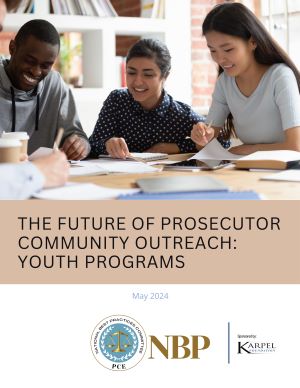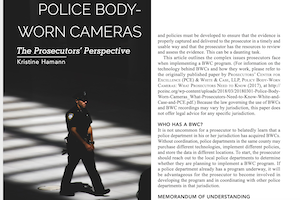Authors: Elaine Borakove, Kristine Hamann, Antonia Merzon
Prosecutors

Featured Resource
The modern prosecutor is very different than the prosecutor of years’ past. Staffing, resources, and communities have all changed. How does a prosecutor keep up? Review our resources to find solutions for your office.
-
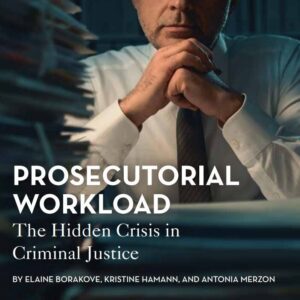
Prosecutorial Workload – The Hidden Crisis in Criminal Justice
-
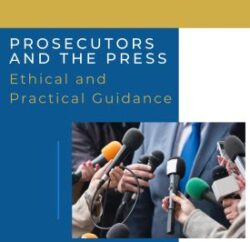
Prosecutors and the Press – Ethical and Practical Guidance
Authors: PCE and KC Steckelberg (Prosecuting Attorneys Association of Michigan)
Read about strategies for working with the press including, ethical rules and guidelines, developing a communications strategy and special considerations for various aspects of a case.
PCE Videos
The Role of the Modern Prosecutor
Additional PCE Resources
-
2024 National Prosecution Best Practices Conference- The Prosecutor Office of the Future: Practice and Policy
PCE, PCE’s National Best Practices Committee, and the Salt Lake County DA’s Office hosted the 4th National Prosecution Best Practices Conference in Salt Lake City on October 7th and 8th,… Read more
-
Office Aids Recruitment and Retention Efforts with Reduced Costs (2023)
Miami-Dade State Attorney’s Office (Miami-Dade County, FL) Population: 2,700,000 | Number of Full-Time Prosecutors:350 | Contact Information With increasing tourism, increasing population, and increasing commerce came increasing employment opportunities for… Read more
-
The New Roles of The Modern Prosecutor
Author: PCE’s National Best Practices Committee (NBP) The traditional role of the prosecutor is as a minister of justice who enforces the law and seeks justice. Modern prosecutors are viewing… Read more
-
Staffing the Prosecutor’s Office of the Future
Author: PCE’s National Best Practices Committee (NBP) This paper details the jobs and tasks that may not have existed in the prosecution office of the past. These positions might be added… Read more
-
DA Develops Cultural Awareness Application for Law Enforcement (2022)
San Diego County District Attorney’s Office (San Diego, CA) Population: 3,298,634 | Number of Full-Time Prosecutors: 330 | Contact Information The San Diego County District Attorney (SDCDA) has developed a… Read more
-
Innovations in Internships (2022)
Clark County District Attorney’s Office (Las Vegas, NV) Population: 2,292,000 | Number of Full-Time Prosecutors: 177 | Contact Information The Clark County District Attorney’s Office (CCDA) has enhanced recruiting using… Read more
-
Prosecutor Presence in Local Law Schools (2022)
Onondaga County District Attorney’s Office (Syracuse, NY) Population: 473,200 | Number of Full-Time Prosecutors: 48 | Contact Information The Onondaga County District Attorney’s Office (OCDA) Chief Administrative Officer serves as… Read more
-
Enhancing Prosecution Office Culture through Surveys (2022)
Summit County Prosecutor’s Office (Akron, OH) Population: 537,600 | Number of Full-Time Prosecutors: 60 | Contact Information The Summit County Prosecutor’s Office (SCPO) has improved office culture using a variety… Read more
-
Prosecutor Outreach Program for New Law Students (2022)
San Diego District Attorney’s Office (San Diego, CA) Population: 3,298,634 | Number of Full-Time Prosecutors: 330 | Contact Information The San Diego County District Attorney (SDCDA) has developed a week-long… Read more
-
Effective Remote Work Strategies (2023)
Yavapai County Attorney’s Office (Prescott, AZ) Population: 242,253 | Number of Full-Time Prosecutors: 41 | Contact Information The Yavapai County Attorney’s Office (YCAO) has developed robust work from home policies… Read more
-
Award Winning Peer Support Program (2022)
San Bernardino County District Attorney’s Office (San Bernardino, CA) Population: 2,123,000 | Number of Full-Time Prosecutors: 220 | Contact Information The San Bernardino County District Attorney’s Office (SBDA) has developed… Read more
-
Peer Support Programs for Prosecutors (2022)
San Bernardino County District Attorney’s Office Population: 2,180,000 Through a peer support program, the San Bernardino County District Attorney’s Office is helping their employees and employees’ family members deal with… Read more
-
PCE Videos: Recruitment and Retention Part II
On July 7, 2022 PCE hosted a second webinar on recruitment and retention for prosecutors. Read more
-
Helping Jurors Address Post Trial Trauma (2021)
Office of the Platte County Prosecutor, Platte County MO Population: 102,848 | Number of Full-Time Prosecutors: 13 The Platte County Prosecutor’s Office provides information connecting jurors with free mental health services… Read more
-
PCE Videos: Recruitment and Retention for Prosecutors Part I
On May 12, 2022 PCE’s Pop-Up included conversations with senior prosecutors, new prosecutors and law school administrators on new interview ideas, building a supportive office culture and improving relationships with… Read more
-
PCE Pop-Up: Lessons Learned from the Pandemic
PCE Pop-Ups review current topics through presentations and breakout groups. On June 21, 2021 we discussed what we’ve learned from the pandemic. Read more
-
PCE Pop-Up: Prosecutor Wellness
Date and Time: Thursday May 6, 2021 from 2:00 PM (EST) – 4:00 PM (EST). Read more
-
The Role of the Modern Prosecutor: Spearheading Innovation
Author: PCE The role of the prosecutor has evolved dramatically over the last 40 years. PCE highlights a sampling of prosecutor innovations in this new report that dives into 221… Read more
-
Using Surveys to Inform Prosecutor Training Needs and Increase Morale in Monroe County (2021)
Monroe County District Attorney’s Office (Rochester, NY) Population: 741,770 | Number of Full-Time Prosecutors: 85 | Contact Information The Monroe County District Attorney’s Office is asking jurors to survey the grand jury process and… Read more
-
Using Surveys to Inform Prosecutor Training Needs in Summit County (2021)
Summit County District Attorney’s Office (Akron, OH) Population: 541,013 | Number of Full-Time Prosecutors: 63 | Contact Information As a new office strategy, grand jurors and trial jurors are asked to… Read more
-
Best Practices for the 21st Century Modern Prosecutor -Progress Through Collaboration
Location: Virtual (location was Salt Lake City, UT, cancelled due to coronavirus) Details: Registration and topic details coming soon! Read more
-
Prosecutors, Police and the Pandemic
Location: Virtual (location was Denver, CO, was cancelled due to corona virus) Time: 9:30 AM (EST) – 5 PM (EST) Details: For Prosecutors Only. To View Agenda Click Here. Read more
-
Innovative Prosecutor Programs
Authors: PCE and Sarah Solano Geisler Innovative programs described in these state-level papers funded by the DOJ’s Office of Justice Programs are newly developed initiatives undertaken by an office in… Read more
-
Prosecutor Wellness
Prosecutor wellness is an issue that is justly receiving increased attention and resources. Here is an award-winning wellness program from the Missoula County Attorney’s Office and some helpful materials from… Read more
-
Statewide Best Practices Committees for Prosecutors: A Nationwide Movement
Author(s): Kristine Hamann, Rebecca Rader Brown A prosecutor’s core mission is and has always been to promote justice and to protect the community by ensuring public safety. Over the past… Read more
-
Prosecutor Seminars in Law Schools
Prosecutor-focused courses in law schools are an excellent way for prosecutors to expose law students to their work and to have students available to do research on prosecution issues. Statewide… Read more
-
Approaches to Reporting the Results of Investigations into Police Involved Fatalities
June 30, 2016 — Volume 15 There has been great scrutiny of police-involved fatalities and how they are handled by prosecutors. Here are four thoughtful approaches by prosecutors on how they… Read more


